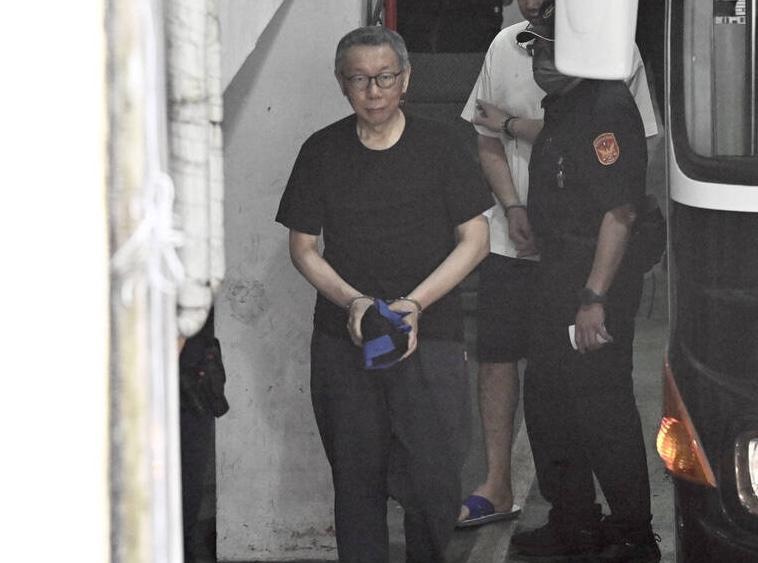In the ongoing Core Pacific City corruption case, lawyers representing former Taipei mayor Ko Wen-je (柯文哲) today questioned whether former Taipei deputy mayor Pong Cheng-sheng (彭振聲) was coerced into making a guilty plea.
The lawyers found issue with Pong’s recorded confession, which took place last year on Sept. 4, believing that the full interrogation was not recorded due to a two-hour gap in the video, after which Pong pled guilty.
Ko’s lawyers questioned what occurred during these two hours and whether prosecutors forced Pong to accuse Ko of having committed a crime.

Photo: Lo Pei-de, Taipei Times
Political pundit Grace Woo (吳靜怡) said that Pong’s confession has been deemed legitimate by both prosecutors and investigators, so there is no need to continuously fabricate claims that it was an illegal interrogation.
The two-hour gap in the recordings is because it was dinnertime at the prison Pong was held at, and he had to eat and take his medication.
Early last month, Pong’s wife died after falling from a building in Kaohsiung, leading to him reportedly recanting his confession and asserting his innocence.
Separately, Taipei prosecutors have indicted former Democratic Progressive Party legislator Chen Ou-po (陳歐珀) and 16 others for accepting bribes and other improper benefits while in office, contravening the Money Laundering Control Act (洗錢防制法).
Chen would later be transferred to the Taipei District Court where a judge is to determine whether he would be required to stay detained.
Chen, who served in the legislature from 2012 to 2020, is suspected of accepting improper benefits or bribes from United Logistics International Co, a Taiwanese firm based in Keelung, during his second term of office from 2016 to 2020.
Chen is also suspected of using his position as lawmaker to propose legislation that would benefit the company and protect its operations, as well as inflating his aide fees.
On June 3, Chen was questioned and detained after investigators carried out raids at 14 locations linked to Chen and others connected to the allegations.

The manufacture of the remaining 28 M1A2T Abrams tanks Taiwan purchased from the US has recently been completed, and they are expected to be delivered within the next one to two months, a source said yesterday. The Ministry of National Defense is arranging cargo ships to transport the tanks to Taiwan as soon as possible, said the source, who is familiar with the matter. The estimated arrival time ranges from late this month to early next month, the source said. The 28 Abrams tanks make up the third and final batch of a total of 108 tanks, valued at about NT$40.5 billion

Two Taiwanese prosecutors were questioned by Chinese security personnel at their hotel during a trip to China’s Henan Province this month, the Mainland Affairs Council (MAC) said yesterday. The officers had personal information on the prosecutors, including “when they were assigned to their posts, their work locations and job titles,” MAC Deputy Minister and spokesman Liang Wen-chieh (梁文傑) said. On top of asking about their agencies and positions, the officers also questioned the prosecutors about the Cross-Strait Joint Crime-Fighting and Judicial Mutual Assistance Agreement, a pact that serves as the framework for Taiwan-China cooperation on combating crime and providing judicial assistance, Liang

A group from the Taiwanese Designers in Australia association yesterday represented Taiwan at the Midsumma Pride March in Melbourne. The march, held in the St. Kilda suburb, is the city’s largest LGBTQIA+ parade and the flagship event of the annual Midsumma Festival. It attracted more than 45,000 spectators who supported the 400 groups and 10,000 marchers that participated this year, the association said. Taiwanese Designers said they organized a team to march for Taiwan this year, joining politicians, government agencies, professionals and community organizations in showing support for LGBTQIA+ people and diverse communities. As the first country in Asia to legalize same-sex

MOTIVES QUESTIONED The PLA considers Xi’s policies toward Taiwan to be driven by personal considerations rather than military assessment, the Epoch Times reports Chinese President Xi Jinping’s (習近平) latest purge of the Chinese People’s Liberation Army (PLA) leadership might have been prompted by the military’s opposition to plans of invading Taiwan, the Epoch Times said. The Chinese military opposes waging war against Taiwan by a large consensus, putting it at odds with Xi’s vision, the Falun Gong-affiliated daily said in a report on Thursday, citing anonymous sources with insight into the PLA’s inner workings. The opposition is not the opinion of a few generals, but a widely shared view among the PLA cadre, the Epoch Times cited them as saying. “Chinese forces know full well that